|
|
|
Sort Order |
|
|
|
Items / Page
|
|
|
|
|
|
|
| Srl | Item |
| 1 |
ID:
096305


|
|
|
|
|
| Publication |
2010.
|
| Summary/Abstract |
Choice feminism is motivated by a fear of politics. It arises in response to three common criticisms of feminism: that feminism is too radical, too exclusionary, and too judgmental. In response, choice feminism offers a worldview that does not challenge the status quo, that promises to include all women regardless of their choices, and that abstains from judgment altogether. Moreover, it enables feminists to sidestep the difficulties of making the personal political: making judgments and demanding change of friends, family, and lovers. Yet judgment, exclusion, and calls for change are unavoidable parts of politics. If feminists are not to withdraw from political life altogether, we have to acknowledge the difficulty of engaging in politics. Political claims are partial; we will inevitably exclude, offend, or alienate some of those whom we should wish to have as allies. The political concerns and dilemmas to which choice feminism responds are very real. However, we can take seriously the political motivations behind choice feminism without withdrawing from politics. Instead, we need to complement an acknowledgment of the political dilemmas facing feminists with a celebration of the pleasures of engaging in politics with those who differ from and disagree with us.
|
|
|
|
|
|
|
|
|
|
|
|
|
|
|
|
| 2 |
ID:
096312


|
|
|
|
|
| Publication |
2010.
|
| Summary/Abstract |
I respond to the foregoing essays and take up an ambivalent defense of Hirshman's argument. While agreeing with various points the contributors make, I highlight the fact that women's choices are still made under conditions of oppression that shape not only the options women have, but the desires themselves that shape their choices. Recognizing oppression as a social phenomenon allows feminists to accept a wider range of individual choices than we might think acceptable under the feminist umbrella, but it also requires a distinction between making a feminist choice and offering feminist support for choice.
|
|
|
|
|
|
|
|
|
|
|
|
|
|
|
|
| 3 |
ID:
096294
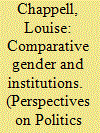

|
|
|
|
|
| Publication |
2010.
|
| Summary/Abstract |
A comparative politics of gender offers an opportunity to consider in detail the operation of gender within political institutions. As such, it contributes to a deeper understanding of the roles and experiences of men and women within political institutions, of the policies, laws and norms that are the outcomes of these institutions, and of the relationship between these institutions and social actors. This essay proposes a multi-directional strategy for undertaking comparative gender and institutional research that includes taking account of similarities and differences within and across states, between states and international institutions, across space as well as across time. It argues that through this research strategy it is possible to gain a more nuanced understanding of gender processes and outcomes, which is valuable to those working both inside and outside political institutions to advance a women's equality agenda.
|
|
|
|
|
|
|
|
|
|
|
|
|
|
|
|
| 4 |
ID:
096299
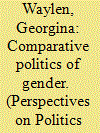

|
|
|
|
|
| Publication |
2010.
|
| Summary/Abstract |
I explore some of the limits and possibilities for a comparative politics of gender (CPG). It argues that a CPG should analyze how major political processes and institutions are gendered thereby increasing our understanding of the major themes of comparative politics and enhancing the subfield. But a CPG should also go beyond this. It should be problem driven and should seek to answer some "big questions" that are important for any efforts to achieve gender equality such as how political change that lessens gender inequality occurs; and how positive gender outcomes come about in a range of contexts. A CPG therefore has an integral connection to a feminist project. I explore some of these themes using the recent literature on gender and transitions to democracy to answer the question under what circumstances can the gender outcomes of transitions be positive.
|
|
|
|
|
|
|
|
|
|
|
|
|
|
|
|
| 5 |
ID:
096289
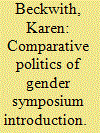

|
|
|
|
|
| Publication |
2010.
|
| Summary/Abstract |
This symposium is the culmination of work that began in October 2007, when fourteen scholars from Australia, the United Kingdom, and the United States convened at Case Western Reserve University to participate in the research conference Toward a Comparative Politics of Gender: Advancing the Discipline along Interdisciplinary Boundaries. The conference was funded by a Presidential Initiative Grant from the University and further supported by an ACES grant. Dr. Gregory Eastwood made available the Library of the Inamori Center for Ethnics and Excellence for our conference meetings. Many thanks to Linda Gilmore, Tonae Bolton-Dove, Gail Papay, Shelley White, and Sharon Skowronski for their expert administrative support. Professors Dorothy Miller (Women's Studies), Rosalind Simson (Philosophy, Law and Women's Studies), and Kelly McMann (Political Science and International Studies) served as discussants of the conference papers. To Theda Skocpol, who presented remarks at the opening dinner of the conference, and to the scholars who participated in the CPG conference and whose contributions are included in this symposium, I offer my deepest appreciation and gratitude.
What do we mean by a comparative politics of gender? How would a comparative politics of gender advance our understanding of politics generally? What would it take to develop a gendered comparative political analysis? In the essays that follow, Teri Caraway, Louise Chappell, Leslie Schwindt-Bayer, and Aili Mari Tripp elaborate their understandings of a comparative politics of gender. Five additional essays focus specifically on issues of democratization (Lisa Baldez, Georgina Waylen), political institutions and representation (Mili Caul Kittilson, Mona Lena Krook), and comparative sex equality policies (Mala Htun and Laurel Weldon). In this introductory essay, I discuss what I mean by "gender" in the context of comparative politics. Briefly enumerating the advantages of comparative politics as a subfield for a gendered analysis of political phenomena, I discuss how a comparative politics of gender can serve to advance our understanding of politics generally, and I provide an example of subfield research-the study of political violence-where gender as a metaconcept may be particularly useful. I conclude by considering what it would mean to our study of gender and of comparative politics to place gender as a central concept in comparative political research and to move to a comparative politics of gender.
|
|
|
|
|
|
|
|
|
|
|
|
|
|
|
|
| 6 |
ID:
096298
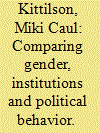

|
|
|
|
|
| Publication |
2010.
|
| Summary/Abstract |
Integrating the behavioral and institutional approaches to comparative politics will provide a more comprehensive theoretical framework for understanding why differences in political engagement among men and women vary cross-nationally and cross-temporally. This essay advances the argument that gender-related policies and institutions are not only outcomes in the political process, but also exert powerful influence over citizens' interests, values, and perceptions of politics. This policy feedback loop has implications for a wide array of political attitudes and activities-from political interest to running for elected office. Specifically, the adoption and expansion of national policies on issues such as equal wages, childcare provision, paid maternity leave, and violence against women carry important messages to the electorate: Issues that disproportionately affect women, long considered private, have become important national policy choices.
|
|
|
|
|
|
|
|
|
|
|
|
|
|
|
|
| 7 |
ID:
096292
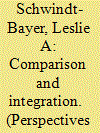

|
|
|
|
|
| Publication |
2010.
|
| Summary/Abstract |
Moving from a "gender and comparative politics" to a "comparative politics of gender" is a challenging proposition. In this essay, I offer two mechanisms for doing this-emphasizing the comparative nature of gender politics research and encouraging greater integration of gender research into the subfield of comparative politics. I illustrate how current research generally uses a "gender and comparative politics" approach that is insufficient for advancing the field and then describe how scholars can work to emphasize greater comparison and integration in the literature. This will help to move the gender and politics literature toward a comparative politics of gender.
|
|
|
|
|
|
|
|
|
|
|
|
|
|
|
|
| 8 |
ID:
096309


|
|
|
|
|
| Publication |
2010.
|
| Summary/Abstract |
One attraction of "choice" feminism has been its refusal to judge the diverse desires of women. Yet for feminism to retain its political vision as a quest for social justice, we must continue difficult conversations concerning how acting on our individual desires impacts the lives of others. In this essay, I argue that feminists can acknowledge women's diverse desires while forging a meaningful feminist community. I make this argument by considering feminism's relationship to time, and particularly how women's diverse desires are read in each moment in time. If we abandon the generational model, wherein each new generation of feminists improves upon the last, for a genealogical perspective where women recognize our feminist origins and empathize with the diverse struggles of other women, we might reaffirm social justice for the community as central to feminist politics. To articulate this possibility, I turn to the work of Simone de Beauvoir to explain her discovery of how her embodiment as a woman and her relationship to femininity becomes a way of grounding a feminist politics. Recognizing the "demands of femininity" in other women's lives allows us to affirm feminist community while retaining the capacity to make judgments that realize social justice as a feminist goal.
|
|
|
|
|
|
|
|
|
|
|
|
|
|
|
|
| 9 |
ID:
096296
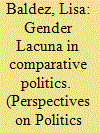

|
|
|
|
|
| Publication |
2010.
|
| Summary/Abstract |
What accounts for the glaring inattention to work on gender within mainstream political science? Part of the problem lies in the substance of scholarship itself. The concepts, central questions, and key variables that predominate in the mainstream literature on comparative democratization and in the literature on gender and democratization have contributed to the gulf between them. But a more fundamental explanation lies in the starting assumptions of scholars in the two camps. Mainstream scholars rarely question whether gender is relevant to politics, and gender scholars rarely question whether gender isn't relevant to politics. I illustrate some ways in which gender could be incorporated into mainstream work, and discuss how gender research could be made more broadly comparative.
|
|
|
|
|
|
|
|
|
|
|
|
|
|
|
|
| 10 |
ID:
096278
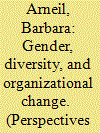

|
|
|
|
|
| Publication |
2010.
|
| Summary/Abstract |
After growing for decades, the Boy Scouts and Girl Scouts both experienced a dramatic drop in membership during the 1970s. Since then their membership patterns have diverged as the Boy Scouts of America (BSA) continues to decline and the Girl Scouts of the USA (GSUSA) has reached near record numbers. These patterns raise two questions: Why the decline? And why the divergence? On the cause of decline, I argue that a younger civil rights generation, informed by a new set of post-materialist values, did not join traditional organizations like the BSA and GSUSA because their values were deemed to be outdated. The challenge for traditional organizations therefore was how to respond. Using path dependency theory, I argue that BSA and GSUSA-shaped by their own unique origins and identities-responded very differently to the critical juncture of the civil rights generation, which in turn explains the subsequent divergence in membership patterns from the 1980s onward. While the BSA rejects such changes in order to defend traditional values, the GSUSA, which established a commitment to challenging gender norms from its birth, embraces the new values and adapts virtually every aspect of its organizational identity to this new generation. As young people see themselves reflected back in the values endorsed by the GSUSA, its membership resurges, while the BSA continues to decline. I conclude by drawing out larger theoretical lessons on the meaning of change in American civil society in light of an increasingly diverse population.
|
|
|
|
|
|
|
|
|
|
|
|
|
|
|
|
| 11 |
ID:
096290
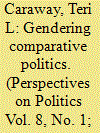

|
|
|
|
|
| Publication |
2010.
|
| Summary/Abstract |
This essay offers a conceptualization of a comparative politics of gender (CPG) and some explanations for why CPG work is marginalized in the comparative politics subfield. I delineate CPG as a field of study in which gendered dependent or independent variables are the defining feature and present illustrative examples of four different types of CPG research. I contend that institutional and historical factors account for much of the marginalization of CPG research, and I propose some courses of actions through which CPG scholars can lessen this marginalization. The failure of comparative politics scholars to engage with gendered work is also a serious problem. The essay concludes by offering some suggestions for better integrating CPG scholarship into the subfield.
|
|
|
|
|
|
|
|
|
|
|
|
|
|
|
|
| 12 |
ID:
096283


|
|
|
|
|
| Publication |
2010.
|
| Summary/Abstract |
In 2006, President Bush publicly stated that, in relation to the same-sex marriage issue, "activist judges" were thwarting the preferred policy of the elected representatives and the expression of popular will embodied in popular initiatives and constitutional amendments. Notwithstanding the philosophical discussion of the constitutionally assigned role of courts in the political system and the idea of judicial independence, President Bush's statement raises an interesting empirical question: In the case of same-sex marriage, have state and federal courts really acted in direct opposition to the expressed policy preferences of current or recent legislative majorities or overturned popular initiatives and constitutional amendments? Using evidence from state and federal legislative and judicial action around same-sex marriage primarily from the fifteen years preceding President Bush's 2006 statement, I argue that, with some rare exceptions, judges can not easily be identified as "activist" on the issue of same-sex marriage even if we assess their actions according to President Bush's criteria.
|
|
|
|
|
|
|
|
|
|
|
|
|
|
|
|
| 13 |
ID:
096303


|
|
|
|
|
| Publication |
2010.
|
| Summary/Abstract |
This symposium examines an emergent orientation within the American feminist movement called "choice feminism." Choice feminists are primarily concerned with increasing the number of choices open to women and with decreasing judgments about the choices that individual women make. Choice feminists are best known for their argument that a woman who leaves the remunerated labor market to care for her children is a feminist in good standing; she makes a feminist decision. While media coverage of choice feminism has been extensive, political scientists have been comparatively quiet. In this symposium, four political scientists analyze and evaluate choice feminism, revealing their disagreement about the validity of the choice feminist position and about the meaning of choice feminism for movement politics, political judgment, and liberal political theory.
|
|
|
|
|
|
|
|
|
|
|
|
|
|
|
|
| 14 |
ID:
096280
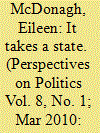

|
|
|
|
|
| Publication |
2010.
|
| Summary/Abstract |
American women attain more professional success in medicine, business, and higher education than do most of their counterparts around the world. An enduring puzzle is, therefore, why the US lags so far behind other countries when it comes to women's political representation. In 2008, women held only 16.8 percent of seats in the House of Representatives, a proportion that ranks America lower than 83 other countries. This article addresses this conundrum. It establishes that equal rights alone are insufficient to ensure equal access to political office. Also necessary are public policies representing maternal traits that voters associate with women. Such policies have feedback effects that teach voters that the maternal traits attributed to women represent strengths not only in the private sphere of the home but also in the public sphere of the state. Most other democracies now have such policies in place, but the United States lacks such policies, which accounts for its laggard status with regard to the political representation of women.
|
|
|
|
|
|
|
|
|
|
|
|
|
|
|
|
| 15 |
ID:
096276
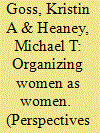

|
|
|
|
|
| Publication |
2010.
|
| Summary/Abstract |
The Million Mom March (favoring gun control) and Code Pink: Women for Peace (focusing on foreign policy, especially the war in Iraq) are organizations that have mobilized women as women in an era when other women's groups struggled to maintain critical mass and turned away from non-gender-specific public issues. This article addresses how these organizations fostered collective consciousness among women, a large and diverse group, while confronting the echoes of backlash against previous mobilization efforts by women. We argue that the March and Code Pink achieved mobilization success by creating hybrid organizations that blended elements of three major collective action frames: maternalism, egalitarianism, and feminine expression. These innovative organizations invented hybrid forms that cut across movements, constituencies, and political institutions. Using surveys, interviews, and content analysis of organizational documents, this article explains how the March and Code Pink met the contemporary challenges facing women's collective action in similar yet distinct ways. It highlights the role of feminine expression and concerns about the intersectional marginalization of women in resolving the historic tensions between maternalism and egalitarianism. It demonstrates hybridity as a useful analytical lens to understand gendered organizing and other forms of grassroots collective action.
|
|
|
|
|
|
|
|
|
|
|
|
|
|
|
|
| 16 |
ID:
096287
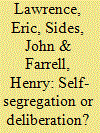

|
|
|
|
|
| Publication |
2010.
|
| Summary/Abstract |
Political scientists and political theorists debate the relationship between participation and deliberation among citizens with different political viewpoints. Blogs provide an important testing ground for their claims. We examine deliberation, polarization, and political participation among blog readers. We find that blog readers gravitate toward blogs that accord with their political beliefs. Few read blogs on both the left and right of the ideological spectrum. Furthermore, those who read left-wing blogs and those who read right-wing blogs are ideologically far apart. Blog readers are more polarized than either non-blog-readers or consumers of various television news programs, and roughly as polarized as US senators. Blog readers also participate more in politics than non-blog readers. Readers of blogs of different ideological dispositions do not participate less than those who read only blogs of one ideological disposition. Instead, readers of both left- and right-wing blogs and readers of exclusively leftwing blogs participate at similar levels, and both participate more than readers of exclusively right-wing blogs. This may reflect social movement-building efforts by left-wing bloggers.
|
|
|
|
|
|
|
|
|
|
|
|
|
|
|
|
| 17 |
ID:
096285
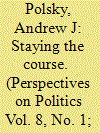

|
|
|
|
|
| Publication |
2010.
|
| Summary/Abstract |
Military stalemate in Iraq and Vietnam presents a puzzle: why do presidents persist in a strategic course that has failed to secure the goals they defined when they chose to embark upon war? In the face of a quagmire, presidents might choose among three broad strategic options-disengagement, escalation, or continuity. I argue that the first alternative, to withdraw, is made impossible by the inflated rhetoric presidents invoke to sell a skeptical public on the necessity for a limited war and by their own conviction (reinforced by core supporters) that the price of defeat is too great. At the opposite pole lies the possibility of full-scale mobilization. But because presidents during the Vietnam and Iraq wars believed they could also pursue expensive domestic agendas, they did not reserve the resources needed for large-scale escalation. In the both cases, too, civilian leaders were deeply skeptical about their military counterparts and discounted their caution that a greater military commitment would be needed. Finally, as wars drag on, public disenchantment prevents presidents from mustering the political support escalation would require. Their early decisions thus leave them with no alternative to their current strategic commitment.
|
|
|
|
|
|
|
|
|
|
|
|
|
|
|
|
| 18 |
ID:
096300
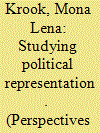

|
|
|
|
|
| Publication |
2010.
|
| Summary/Abstract |
How does a comparative politics of gender improve our understanding of political representation? I map the existing feminist literature on this topic, which asks questions like why there are so few women elected to political office, whether women in politics represent women as a group, and how the presence or absence of women in politics affects voter perceptions and opinions. I then consider how scholars-both feminist and non-feminist-might generate new insights on political representation by expanding what is thought of as a "case" and what is meant by the term "gender." I recommend increasing the scope of comparison by (1) opening up the definition of a case to include a broader range of units and events and (2) connecting the study of a single unit to patterns generated by the study of other similar units. I suggest moving away from equating women with gender by exploring (1) relations between women and men and (2) the impact of masculinities and femininities on the conduct of political life. While developed in relation to research on representation, this approach offers broader advice for capturing the diverse and gendered nature of political dynamics observed around the world.
|
|
|
|
|
|
|
|
|
|
|
|
|
|
|
|
| 19 |
ID:
096307


|
|
|
|
|
| Publication |
2010.
|
| Summary/Abstract |
How should feminist theorists respond when women who claim to be feminists make "choices" that seemingly prop up patriarchy, like posing for Playboy, eroticizing male dominance, or advocating wifely submission? This article argues that the conflict between the quest for gender equality and the desire for sexual pleasure has long been a challenge for feminism. In fact, the second-wave of the American feminist movement split over issues related to sexuality. Feminists found themselves on opposite sides of a series of contentious debates about issues such as pornography, sex work, and heterosexuality, with one side seeing evidence of gender oppression and the other opportunities for sexual pleasure and empowerment. Since the mid-1990s, however, a third wave of feminism has developed that seeks to reunite the ideals of gender equality and sexual freedom. Inclusive, pluralistic, and non-judgmental, third-wave feminism respects the right of women to decide for themselves how to negotiate the often contradictory desires for both gender equality and sexual pleasure. While this approach is sometimes caricatured as uncritically endorsing whatever a woman chooses to do as feminist, this essay argues that third-wave feminism actually exhibits not a thoughtless endorsement of "choice," but rather a deep respect for pluralism and self-determination.
|
|
|
|
|
|
|
|
|
|
|
|
|
|
|
|
| 20 |
ID:
096295


|
|
|
|
|
| Publication |
2010.
|
| Summary/Abstract |
I ask whether comparative politics of gender (CPG) can maintain its normative roots in concerns related to social justice as it moves increasingly away from its interdisciplinary moorings in gender/women's studies and gravitates toward disciplinary concerns. I call for a broad framework for CPG, examining 1) the range and relevance of the questions we ask, the utility of interdisciplinarity, and the range of methods employed; 2) the research collaborations we develop, especially outside of the US-Europe nexus; 3) the way our work is disseminated; and 4) how it engages the policy and practitioner community.
|
|
|
|
|
|
|
|
|
|
|
|
|
|
|
|
|
|
|
|
|